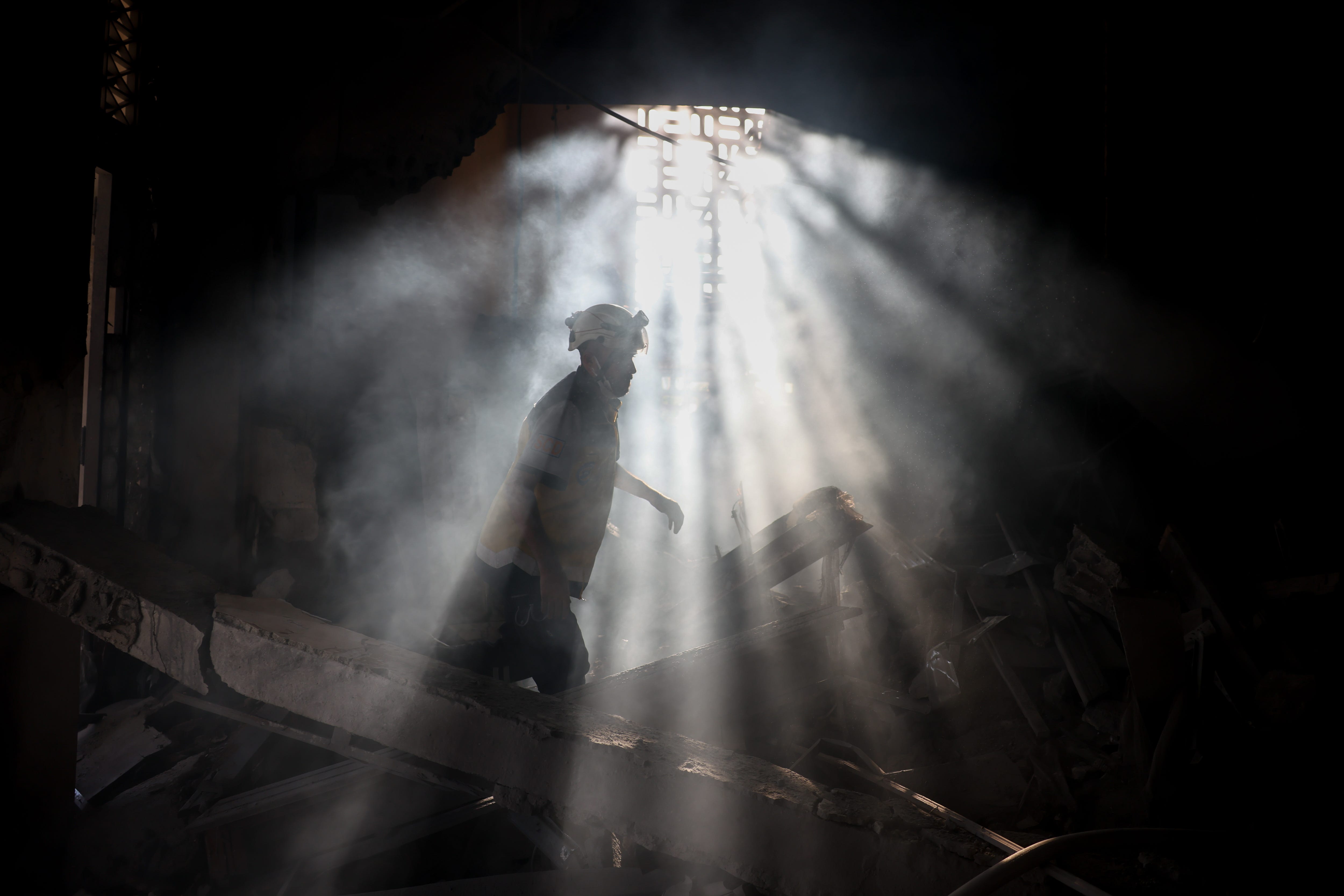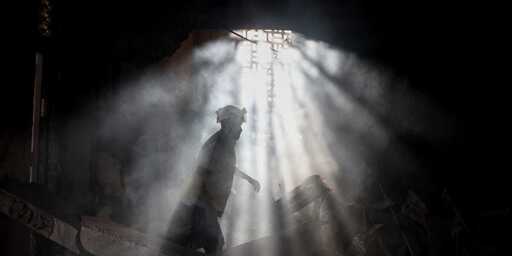We have a commitment to ensuring that our journalism is not locked behind a paywall. But the only way we can sustain this is through the voluntary support of our community of readers. If you are a free subscriber and you support our work, please consider upgrading to a paid subscription or gifting one to a friend or family member. You can also make a 501©(3) tax-deductible donation to support our work. If you do not have the means to support our work financially, you can do your part by sharing our work on social media and by forwarding this email to your network of contacts.
 Aftermath of Israeli airstrikes on targets In Damascus. Photo by Ali Haj Suleiman/Getty Images.
Aftermath of Israeli airstrikes on targets In Damascus. Photo by Ali Haj Suleiman/Getty Images.
Story by Murtaza Hussain with on-the-ground reporting provided by Egab.
SWEIDA, SYRIA—On Wednesday afternoon, famous landmarks in the Syrian capital of Damascus became scenes of carnage as Israeli airstrikes struck major government buildings in the heart of the city. Among the sites hit by a wave of Israeli attacks were the General Staff headquarters of the new Syrian military, located in the city’s iconic Umayyad Square, as well as a building on the outskirts of the Syrian presidential compound.
Hassan Al-Mukhtar, a 29-year-old Syrian journalist working at the Syrian Radio and Television Corporation, was in the area of the General Staff headquarters when the Israeli airstrikes hit.
“When I arrived in front of the main gate of the General Staff headquarters in Damascus, I was shocked by the second of a double airstrike that targeted the Defense Ministry’s building, close to where I was standing only seconds earlier,” Al-Mukhtar recounted. “The force of the explosions threw me off balance on my motorcycle, and I fell to the ground. Stones and shrapnel began raining down on me and scattering all around me.”
Dramatic images of the bombing of the General Staff headquarters were broadcast live on multiple Syrian news channels. Anchors were interrupted mid-broadcast by a series of large explosions that destroyed parts of the building, while sending civilian traffic and pedestrians fleeing from the assault. Meanwhile, smoke was visible in the hills above the city from a separate wave of Israeli strikes that reportedly hit a building on the outskirts of the presidential palace compound. Initial reports suggested that at least three people were killed in the Israeli bombings in Damascus, along with dozens more wounded.
Al-Mukhtar sustained minor injuries and smoke inhalation, but said that the psychological impact of the attack on a major landmark in the center of Damascus was profound. “The terror in their eyes was immense,” he said of the civilians caught in the attack.
Support Drop Site’s reporting on the ground in Syria by subscribing.
The Israeli government has claimed that its attacks on Damascus were intended as a defense of the Syrian Druze community. In recent days, deadly clashes between Druze militias, Bedouin tribes, and armed groups associated with the Syrian government have taken place in the southern governorate of Sweida. In a statement giving the reason for its assault on the capital, the Israeli military said that, “the military headquarters in Damascus is the location from which Syrian regime commanders direct combat operations and deploy regime forces to the As-Suwayda area,” adding that the Israeli military “remains prepared for various scenarios.”
The Syrian government led by interim president Ahmad al-Sharaa issued a speech late Wednesday night characterizing the violence as part of an Israeli effort to divide the country along sectarian lines. “The Israeli entity—which has always sought to destabilize us and sow discord among us since the fall of the former regime—is once again trying to turn our sacred land into an endless arena of chaos,” Sharaa said in a speech. “Through this, it aims to fracture our people’s unity and weaken our ability to continue the path of reconstruction and national revival.”
Prior to bombing Damascus on Wednesday, Israeli forces had also carried out airstrikes targeting Syrian forces around Sweida earlier in the week that killed a number of Syrian troops. After the Israeli attacks earlier this week, the Syrian government issued a statement stating that it, “condemns in the strongest terms the treacherous Israeli aggression carried out today through coordinated drone attacks and military airstrikes,” adding that, “a number of our armed forces and security personnel” and “several innocent civilians” were killed in the attacks.
The clashes in Sweida that preceded the Israeli assault on Damascus began after the government dispatched troops earlier this week to quell fighting between Druze and Bedouin militias in the region that was triggered by the reported abduction of a Druze merchant by Bedouin groups and retaliatory attacks by Druze militias that have maintained an autonomous presence in the region. Pro-government militias are then alleged to have engaged in attacks on Druze groups in the region, which had previously rejected government authority being imposed on Sweida.
The fighting drove thousands from their homes while resulting in disruptions of internet, electricity, and even water to the region on Syria’s southern border near Israel. Civil activist Mulehm Alabaza said that the hellish week in the region encapsulated the “humiliation and helplessness,” felt by many Druze residents, “because they couldn’t defend their homes.”
Alabaza, 37, had traveled from Lebanon months earlier for what should have been a peaceful family visit and farewell before he joined his wife in Italy. Instead, he found himself trapped in a nightmare, one of just ten families who couldn’t escape the Teachers’ Housing complex as militants prowled the streets, ensuring no civilian could safely leave their homes.
“There was no electricity and no water and fuel was scarce for generators across the city. Moving from house to house on Tuesday and Wednesday was unsafe,” Alabaza told Drop Site News. His account was one of several from Druze residents in the region who testified to abuses by pro-government and Bedouin militias in the region, including an attack on a guesthouse owned by Alabaza’s brother-in-law which killed nine people. Drop Site News was unable to independently verify the details of these reports.
As of Thursday a tentative ceasefire appeared to be coming into place in the region, including the withdrawal of government troops. But the toll of the fighting had been devastating for Sweida. According to the Syrian Observatory for Human Rights, at least 516 fighters and civilians were killed on both sides across four days of violence in the region. Videos on social media appeared to show both dead and wounded Druze and pro-government fighters, as well as instances of humiliation including the forcible shaving of beards and mustaches of captured Syrian Druze. In the aftermath of the government withdrawal, revenge killings targeting Bedouin civilians by Druze militias have also been alleged.
In his address on Wednesday night, Sharaa attempted to send a message to the Druze community in Syria reassuring them after the reported sectarian attacks in Sweida. “I extend a special message to our Druze brethren, who are an integral part of this nation’s fabric: Syria will never be a land of partition or fragmentation or division between its sons. Protecting your rights and freedoms is a top priority for us.”
The attacks in Sweida and Israeli intervention come after repeated Israeli incursions into southern Syria since the fall of the previous government. The Israeli military has expanded a military occupation in the region, aimed at creating a growing “buffer zone” on Syrian territory, and has used protection of the Druze minority which is based in Sweida as part of its justification. The efforts have been denounced by the Syrian government and its supporters as part of an effort to cause the dissolution of the country by partitioning it on ethnic lines. But Israel’s reasons for escalating may have just as much to do with its own domestic politics.
Israel is home to a small but highly visible Druze minority that serves in its military, and from which the government has sought to win favor. Responding to what they described as calls from Israel’s own Druze minority to intervene in Syria, Israeli officials have vowed to escalate their attacks. "Druze brothers in Israel, you can count on the IDF to protect your Druze brothers in Syria. Prime Minister Netanyahu and myself, as Defense Minister, have made a commitment and will abide by it,” Israeli defense minister Israel Katz said in a statement on social media, announcing that Israeli attacks against Syria would continue.
Other Israeli officials have gone even further, suggesting that the real goal of Israeli operations should be the destruction of the new government entirely. On Tuesday, Israeli Minister for Diaspora and Combatting Antisemitism Amichai Chikli called for Israel to assassinate Syrian interim president Ahmad al-Sharaa, stating, “Anyone who thinks Ahmad al-Sharaa is a legitimate leader is gravely mistaken. He is a terrorist, a barbaric murderer who should be eliminated without delay.” Israeli National Security Minister Itamar Ben-Gvir echoed these statements in a video, stating that, “the only thing that needs to be done with Jolani is to eliminate him.”
The operation against Syria has also had a personal benefit for Netanyahu. The bombing of Damascus this Wednesday led to the abrupt adjournment of his testimony in an ongoing criminal trial related to corruption charges.
Druze Divisions
Since the fall of the previous Syrian government, leaders from the Syrian Druze community have been split on their stance towards the new government. While the majority of Druze factions in Syria have aligned with the new government in Damascus, factions in the south, led by influential Druze spiritual leader Sheikh Hikmat al-Hijri, have demanded administrative autonomy, and declined to lay down arms or integrate with the central government. Al-Hijri denounced the new Syrian government this March as an “extremist government in every sense of the word,” and has repeatedly appealed for Israeli support and intervention in Sweida.
Although the situation has tentatively stabilized following a ceasefire and withdrawal of government troops from Sweida, the violence this week will likely exacerbate divisions in the region and make it harder for the government to reassert authority over the region.
Seventy-seven-year-old Hassan al-Atrash, a retired biology teacher, said that he witnessed attacks by government forces near a local hospital while trapped with his family during the fighting.
“Armed forces were specifically stationed at the vicinity of the hospital,” al-Atrash, who lives nearby the hospital, recounted, his voice heavy with disbelief. “There were attempts to prevent people from accessing the emergency room. More than one person was killed by gunfire besieging the emergency area… We haven’t heard of such things except in Gaza.”
In response to the attacks, Israeli Druze leaders close to al-Hijri held public demonstrations demanding the Israeli government intervene in Syria in support of him and the broader Druze community in Sweida. But views among other Druze figures in the region are divided. Lebanese Druze leader Walid Jumblatt, who has built ties with the new government in Damascus, called for dialogue to end the fighting, blaming Israel for attempting to use divisions to cause the dissolution of Syria. “Israel protects no one,” Jumblatt said on Wednesday. “It seeks only to fuel further bloodshed and chaos in Sweida and Syria at large.”
The Israeli attacks this week were just the latest in a long campaign of airstrikes and ground operations carried out by Israel in southern Syria since the fall of the Assad government last December. For the time being, the attacks in Sweida may have helped the Israeli government shore up support from its own Druze community, while the bombings against high-level government targets in Damascus sent a message to the new authorities in Syria that their government could be terminated at will.
While Israeli media reports have suggested that Syria and Israel have been engaged in backchannel talks on security issues and possibly even normalizing relations between the two countries, violence, has expanded almost continuously since December, alongside the growing Israeli occupation of southern Syria. The attacks on Damascus drew the condemnation of the Syrian government, as well as a large group of regional countries, including Saudi Arabia, the United Arab Emirates, Egypt and Turkey, denouncing what it called attacks on Syrian sovereignty by Israel.
The U.S. has sought to portray itself as mediating between Syria and Israel amid the growing conflict. In an Oval Office press conference, US Secretary of State Marco Rubio said that a “misunderstanding” between the Syrian and Israeli governments had led to the wave of Israeli airstrikes on the Syrian capital.
But for some locals in Sweida, the violence wasn’t just about territory or politics—it was an existential assault on Druze identity itself. “You cannot enter the city of Suwayda as an aggressor,” Al-Atrash declared, regarding the decision by pro-government militias to deploy to the region following clashes with bedouin groups. “The Druze Mountain residents historically don’t accept that. The government should have reached an understanding with Suwayda residents through negotiations, not arms.”
This story was published in collaboration with Egab.
From Drop Site News via this RSS feed


